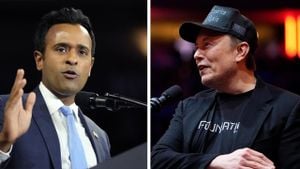The NBA community has rallied around Kyle Singler after the retired basketball player shared an alarming video on Instagram, highlighting his mental health struggles and raising concerns about his well-being. Singler, who had successful stints with the Oklahoma City Thunder and Detroit Pistons, posted the 90-second video on his official account, where he appeared visibly distressed.
Singler’s message was heavy: he expressed feelings of neglect, fear, and emotional turmoil. While many athletes publicly praise their careers, Singler's vulnerability indicates the darker side of professional sports often hidden from view. He stated, "I fear for my life every day," emphasizing the level of distress he feels due to his current situation. Through his words, Singler painted a poignant picture of isolation and misunderstanding within his community, mentioning how he often feels treated as if he might present problems rather than being recognized for his attempts to contribute positively.
The video, which has impacted many within the basketball community, showcased Singler speaking candidly about the trauma he has faced: "People make me look out as if I’m gonna be someone that's gonna be a problem and make things difficult for people when I’m only trying to be helpful." This raw expression of his inner struggles has struck a chord with fellow players and fans alike, prompting them to reach out with messages of support.
Kevin Love, notable for his own advocacy for mental health awareness, was quick to offer encouragement. He commented on Singler’s post saying, "I love you Kyle. Hit me whenever. Please." Love's swift response is indicative of the deep connections shared between players, especially those who understand the unique pressures and challenges faced by elite athletes.
Adding to the chorus of voices, Andre Drummond and Isaiah Thomas also took to social media to express their solidarity. Drummond communicated directly on the post, stating, "You aren't alone brother! I'm here for you," serving as a reminder of the strong bonds formed during shared experiences on the court.
Singler, who was drafted by the Detroit Pistons with the 33rd overall pick in the 2011 NBA Draft, enjoyed considerable success both at Duke University, where he was part of the 2010 NCAA championship team, and later during his six seasons in the NBA. After his last season with the Thunder, he retired from basketball due to personal reasons and has remained out of the public eye, leading up to this recent video.
This incident sheds light on how athletes are often perceived and treated, particularly when facing personal struggles. Despite their success, many find themselves alone when grappling with mental health issues. Singler’s honesty has opened up conversations around the need for improved mental health support within the sports community. Kevin Love's push for fans and the larger basketball community to show support extends beyond empathy; it calls for actionable kindness and outreach to those who may be struggling.
Through messages of care and encouragement, it’s clear the NBA community is stepping up to remind Singler, and others like him, they are not alone. Mental health can be as challenging to confront as competing against elite athletes on the court, and showing up for one another, as Love and Drummond have done, embodies the spirit of solidarity that's so integral to sports culture.
Singler's call for help has not gone unnoticed, with many hoping his bravery will inspire fellow athletes to speak candidly about their mental health challenges, too. Advocates urge this moment to become part of broader efforts advocating for mental health awareness and support systems within professional sports. The basketball world has rallied, and there’s hope moving forward.
It’s heartening to see such support emerge, but it raises questions. How can organizations within professional sports create environments where athletes feel safe to express vulnerability? How can fans enjoy the sport without overlooking the people behind the teams? Singler’s video has sparked these dialogues, reinforcing the necessity of addressing mental health not just privately but as part of the public discourse surrounding athletic careers.
For many, the conversation may end at the keyboard, but for the NBA family, the call to action remains live. The basketball fraternity’s outreach to Kyle Singler has ignited hope for change, not just for Singler but possibly for many others silently facing similar struggles. Mental health matters now more than ever, and the community's response serves as both support and the foundation for future awareness.



